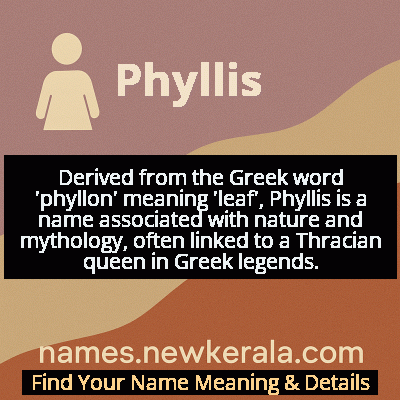Phyllis Name Meaning & Details
Origin, Popularity, Numerology Analysis & Name Meaning of Phyllis
Discover the origin, meaning, and cultural significance of the name PHYLLIS. Delve into its historical roots and explore the lasting impact it has had on communities and traditions.
Name
Phyllis
Gender
Female
Origin
Greek
Lucky Number
2
Meaning of the Name - Phyllis
Derived from the Greek word 'phyllon' meaning 'leaf', Phyllis is a name associated with nature and mythology, often linked to a Thracian queen in Greek legends.
Phyllis - Complete Numerology Analysis
Your Numerology Number
Based on Pythagorean Numerology System
Ruling Planet
Moon
Positive Nature
Diplomatic, friendly, artistic, empathetic.
Negative Traits
Over-sensitive, moody, indecisive, prone to self-pity.
Lucky Colours
Green, cream, white.
Lucky Days
Monday.
Lucky Stones
Pearl, moonstone.
Harmony Numbers
1, 3, 4.
Best Suited Professions
Diplomats, mediators, caregivers, artists.
What People Like About You
Cooperative spirit, friendliness, artistic talent.
Famous People Named Phyllis
Phyllis Diller
Comedian and actress
Pioneering female stand-up comedian who broke gender barriers in comedy
Phyllis Wheatley
Poet
First African American and first enslaved person to publish a book of poetry
Phyllis Schlafly
Political activist and author
Led successful conservative movement against the Equal Rights Amendment
Phyllis Logan
Actress
Known for her role as Mrs. Hughes in Downton Abbey
Name Variations & International Equivalents
Click on blue names to explore their detailed meanings. Gray names with will be available soon.
Cultural & Historical Significance
Extended Personality Analysis
Individuals named Phyllis often exhibit personality traits that reflect their name's natural origins and historical significance. They tend to be grounded, practical people with a strong sense of tradition and family values. Their 'green bough' symbolism suggests resilience and adaptability - like trees that weather storms but continue to grow. Many Phyllises demonstrate exceptional organizational skills and attention to detail, making them reliable in both professional and personal contexts. They often possess a quiet confidence and emotional stability that makes them excellent listeners and problem-solvers. Their connection to nature through their name's meaning may manifest as environmental consciousness, love for gardening, or appreciation for natural beauty. At the same time, their mythological background lends a depth of character that combines strength with sensitivity. They're typically patient, nurturing individuals who value deep, lasting relationships over superficial connections. This combination of practical wisdom and emotional intelligence makes Phyllises often the 'rock' in their social and family circles, providing stability while encouraging growth in others.
Modern Usage & Popularity
In contemporary times, Phyllis has become a distinctly vintage name that peaked in popularity during the 1930s and 1940s but has since declined significantly. According to recent naming statistics, Phyllis hasn't ranked in the top 1000 baby names in the United States since the mid-1990s, making it quite rare among newborns today. However, it maintains a strong presence among women now in their 70s and 80s, creating a generational association that may contribute to its current lack of popularity. Despite this, the name continues to appear in literary contexts, academic circles, and occasionally among parents seeking unique classical names. Its decline follows a common pattern where names become strongly associated with a particular generation before potentially cycling back into fashion decades later. The current trend toward nature-inspired names and the growing appreciation for vintage classics could position Phyllis for a future revival, particularly as the children of the 21st century seek names with historical depth and meaningful origins that stand apart from contemporary naming trends.
Symbolic & Spiritual Meanings
The symbolic meanings associated with Phyllis extend far beyond its literal translation of 'green bough' to encompass profound metaphorical significance. In the context of growth and development, the name represents the idea of reaching upward while remaining rooted - much like a tree branch that grows toward the sky while maintaining its connection to the trunk and roots. This symbolizes balanced progress and the importance of maintaining one's foundation while pursuing growth. The almond tree transformation from the original myth adds layers of symbolism around resurrection, hope, and the miraculous - the idea that life and love can transcend even death. In psychological terms, Phyllis represents the integration of strength and flexibility, suggesting the ability to adapt to changing circumstances without losing core identity. The name also carries associations with protection and shelter, as boughs provide shade and refuge, making it symbolic of nurturing and caretaking qualities. These rich symbolic layers make Phyllis a name that speaks to enduring values of resilience, natural wisdom, and the cyclical nature of life and renewal.

